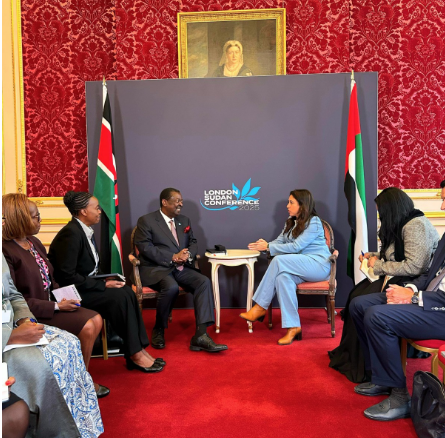Kenya also called for respect for initiatives by the African Union
In Summary
- Mudavadi said Kenya insisted that pressure must be exerted in equal measure on the parties to the conflict to force them to the negotiating table.
- The UK meeting marked the second year of the eruption of the war in Sudan that has claimed the lives of thousands and displaced millions of innocent civilians.
Kenya has called for concerted efforts towards addressing the Sudan crisis, regretting that a consensus was not arrived at on a joint communique issued in London.
Prime Cabinet Secretary Musalia Mudavadi, who is participating in the London Conference on Sudan, noted that Kenya called for an all-inclusive dialogue for the diverse Sudanese people.
In a statement, Mudavadi said Kenya insisted that pressure must be exerted in equal measure on the parties to the conflict to force them to the negotiating table.
“Kenya vouched for the creation of safe spaces for groups to hold conversations from which points of agreement could converge to bring all the voices together, and noted that it had provided such spaces in its long, illustrious history of peace mediation and would continue to do so,” he said.
He said most participants decried the dire situation in Sudan, stating that there was no military solution to the conflict, and urged warring parties to cease hostilities, embrace dialogue, and implement their humanitarian and protection of civilian commitments.
“They stressed the urgency for the resolution of the Sudan crisis to alleviate the plight of civilians, mainly women and children, who suffer the brunt of the wars,” he said.
The gathering in the UK came at a significant moment, marking the second year of the eruption of the war in Sudan that has claimed the lives of thousands and displaced millions of innocent civilians.
Mudavadi further noted that Kenya called for respect for the African Union and regional institutions established under the African Union, including the IGAD, which is the most appropriate body to handle issues in the Horn of Africa.
“Kenya decried the undermining of the ongoing initiatives by the African institutions, leading to delays in the resolution of conflicts on the continent, including in Sudan, and called for the mainstreaming of the work of the many initiatives into the critical regional institutions,” he noted.
Mudavadi added that Kenya called for candid conversations with those responsible for funding and providing capabilities to the warring parties in Sudan.
“Kenya underscored its commitment to the humanitarian situation in Sudan, citing its involvement in the rescue and evacuation of more than 2000 Kenyan and foreign nationals working for international organizations when the war erupted in 2023,” he stated.
The conference is being co-chaired by the United Kingdom, the African Union (AU), France, Germany, and the European Union (EU).
The forum also brought together Foreign Ministers and other High-level representatives from Canada, Chad, Egypt, Ethiopia, the Kingdom of Saudi Arabia, Norway, Qatar, South Sudan, Switzerland, Türkiye, the United Arab Emirates, Uganda, and the United States of America.
Others are High-level Representatives of the Intergovernmental Authority on Development (IGAD), the League of Arab States (LAS), and the United Nations (UN). By Allan Kisia, The Star






